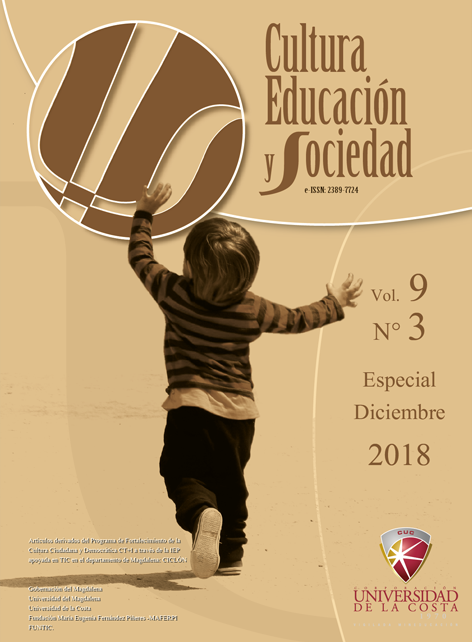Implementation of activities based on Reading Comprehension As a strategy for strengthening critical reading
DOI:
https://doi.org/10.17981/cultedusoc.9.3.2018.34Keywords:
Reading comprenhension, critical reading, competences.Abstract
This research addresses reading comprehension as one of the basic skills that must be acquired throughout the school period, in this sense, if students are not able to understand what they read, much less can develop a position in front of what they read. same, so it is necessary to develop reading comprehension to contribute to a global understanding of the texts. For this, a diagnosis of the levels of reading skills of the students of 3rd of the Gilma Royero Solano Institution was made based on the results of the 2016 Saber Tests, after establishing a series of strategies focused on reading comprehension in the level of critical reading and apply them to the same group in order to improve their reading skills, compare them with the results obtained in tests made by teachers from the Saber in 2017.
Downloads
References
Ausubel, David (1980). Psicología educativa: un punto de vista cognoscitivo. (4ª Edición). Ed. Trillas. México.
Avendaño, I. & Martínez, D. (2013). Competencia lectora y el uso de las nuevas tecnologías de la información y comunicación. Revista Escenarios 11(1), 7-22.
Bernabeu, N. (2001). Cuadernos de literatura infantil y juvenil. N0 136, págs. 26-35
Dehaene S. et al. (2015): “Illiterate to literate: behavioral and cerebral changes induced by reading acquisition”. Nature Review Neuroscience 16(4), 234-244.
Franco, M. (2012). Estrategias de enseñanza para la promoción de la comprensión lectora desde el aprendizaje significativo. Cultura, Educación y Sociedad 3(1), 175-18
Ferreiro, E. (2003). La escuela no forma buenos lectores. Diario La Nación.
García, H. y Arrieta, A. (2016). Potencialización del pensamiento crítico a través de la hipotemetacomprensión textual (hmt). Cultura Educación y Sociedad 7(2), 54-71.
Molina, S.: Batería diagnóstica de la Madurez para la Lectura. Madrid, CEPE, 1984.
Organización para la Cooperación y el Desarrollo Económicos (OCDE) (2009). Pisa 2009 Assessment Framework - Key Competencies in Reading, Mathematics and Science. París: OCDE
PISA. (2014). Programa Internacional de Evaluación de Estudiantes (Tercera ed.) Santiago, Chile. Agencia de Calidad de la Educación.
SEP. (2011). Manual de procedimiento para el fomento y la valoración de la competencia lectora en el Aula. México: Secretaría de Educación Pública
Serrano, S. (2008). El desarrollo de la comprensión crítica en los estudiantes universitarios: hacia una propuesta didáctica. Mérida: Universidad de los Andes.
Solé, I. (2012). Competencia lectora y aprendizaje. Revista Iberoamericana de Educación (OEI), 2012, No. 59, p. 43-61.
Viñao, A. (2002) La enseñanza de la lectura y la escritura: análisis socio-histórico. En Anales de documentación. 5 (1), 345-359.
Wallace, C. (2009). EAL Learners and Critical Reading. Reader in Education, Institute of Education, 12-17. University of London, UK
Downloads
Published
How to Cite
Issue
Section
License
Copyright (c) 2018 CULTURA EDUCACIÓN Y SOCIEDAD

This work is licensed under a Creative Commons Attribution-NonCommercial-NoDerivatives 4.0 International License.
![]()
Creative Commons 2020 CULTURA EDUCACIÓN Y SOCIEDAD
This article is under international license Creative Commons Reconocimiento-NoComercial-SinObrasDerivadas 4.0.
The published articles are the sole responsibility of their authors and do not necessarily reflect the opinions of the editorial committee.
CULTURA EDUCACIÓN Y SOCIEDAD respects the moral rights of its authors, who assign to the editorial committee the patrimonial rights of the published material. In turn, the authors inform that this work is unpublished and has not been previously published.
All articles are under a:
Licencia Creative Commons Atribución-NoComercial-SinDerivadas 4.0 Internacional.
![]()


 English
English
 Español (España)
Español (España)




_12.53_.27_p_. m_._3.png)





_12.57_.35_p_. m_._3.png)
_12.50_.37_p_. m_._3.png)



